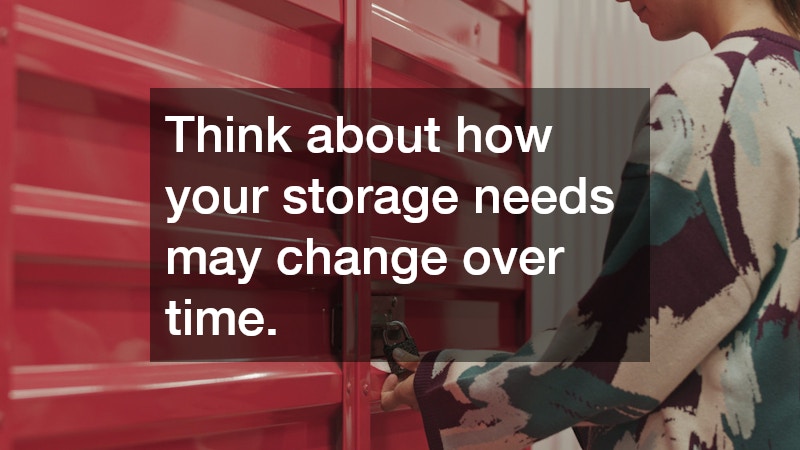Finding extra space to store your belongings can be a challenge, especially when moving, downsizing, or simply decluttering your home or office. Local storage facilities offer a convenient solution, providing secure, accessible spaces for everything from seasonal items to important business inventory. However, with many options available, choosing the right facility to meet your specific needs requires thoughtful consideration.
This blog will guide you through the key factors to evaluate when selecting storage facilities, helping you make an informed decision that ensures your belongings stay safe and accessible.
Determine Your Storage Needs
Before beginning your search for storage facilities, it’s important to assess what you plan to store and for how long. Different storage needs require different types of units.
For example, storing furniture or large appliances might require a climate-controlled unit to prevent damage from humidity and temperature fluctuations. In contrast, tools or non-perishable items may not need such special conditions.
Consider the size of the unit you need. Storage facilities typically offer a range of sizes, from small lockers to large garage-sized spaces. Measure your items or create a list of what you intend to store to estimate the appropriate unit size. Choosing a unit that’s too small can lead to overcrowding, while an unnecessarily large space might mean paying more than needed.
Location and Accessibility
One of the most important factors when choosing local storage facilities is their proximity to your home or workplace. Convenient location makes it easier to access your belongings whenever needed, saving you time and transportation costs. Facilities near your home or along your regular commute can be particularly beneficial for frequent visits.
Additionally, consider the facility’s hours of operation. Some storage centers offer 24/7 access, while others may have limited hours. Think about your schedule and whether you need flexible access or if standard business hours will suffice.
Accessibility also includes the ease of loading and unloading items. Look for facilities with ground-level units, wide driveways, and loading docks, which can make moving bulky or heavy items much easier.
Security Features and Safety
Security is a top priority when choosing storage facilities. You want to be confident that your belongings are protected from theft, vandalism, and environmental damage. Most reputable facilities offer a combination of security measures such as gated access, surveillance cameras, on-site staff, and individual unit alarms.
Check if the facility has secure fencing and well-lit premises. Some locations may also have electronic gate codes or keypad entry to restrict access only to renters. Understanding the security protocols can help you feel more comfortable storing valuable or sentimental items.
Inquire about insurance options as well. While some homeowner’s insurance policies cover stored items, additional coverage might be necessary to protect against potential damage or loss while in storage.
Customer Service and Reputation
Good customer service can make your storage experience much smoother. Friendly, knowledgeable staff can answer your questions, provide helpful recommendations, and assist if you encounter any issues.
Research storage facilities online to read reviews and testimonials from previous customers. Positive feedback about responsiveness, cleanliness, and security is a good indicator of a reliable facility. Conversely, repeated complaints should be a red flag.
Visiting the facility in person also gives you a chance to meet the staff and get a feel for how they operate. A well-run storage center will be welcoming and transparent about their services.
Additional Amenities and Features
Some local storage facilities offer extra amenities that can enhance your experience. Climate-controlled units help protect sensitive items like electronics, artwork, or documents from extreme temperatures and humidity.
Other features to consider include on-site packing supplies, moving equipment rentals, and covered loading areas that shield you from weather during move-in and move-out.
Certain facilities might also have vehicle storage options, such as for boats, RVs, or cars, if that’s relevant to your needs.
Planning for the Future
Think about how your storage needs may change over time. You might initially rent a smaller unit but need to upgrade as you accumulate more items. Choose local storage facilities that allow flexible unit size changes or easy transfers.
Also, consider the potential for long-term storage. Facilities with a strong track record and stability will give you peace of mind if you plan to store belongings for an extended period.
Selecting the right storage facilities involves careful evaluation of your storage requirements, location preferences, security needs, and budget. By taking the time to research and visit different options, you can find a facility that not only protects your belongings but also provides convenient access and excellent customer service.
Choosing wisely ensures that your stored items remain safe and in good condition, giving you peace of mind and freeing up valuable space in your home or office. Whether you need short-term storage during a move or long-term solutions for extra inventory, the best local storage facilities will meet your needs and support your lifestyle.

